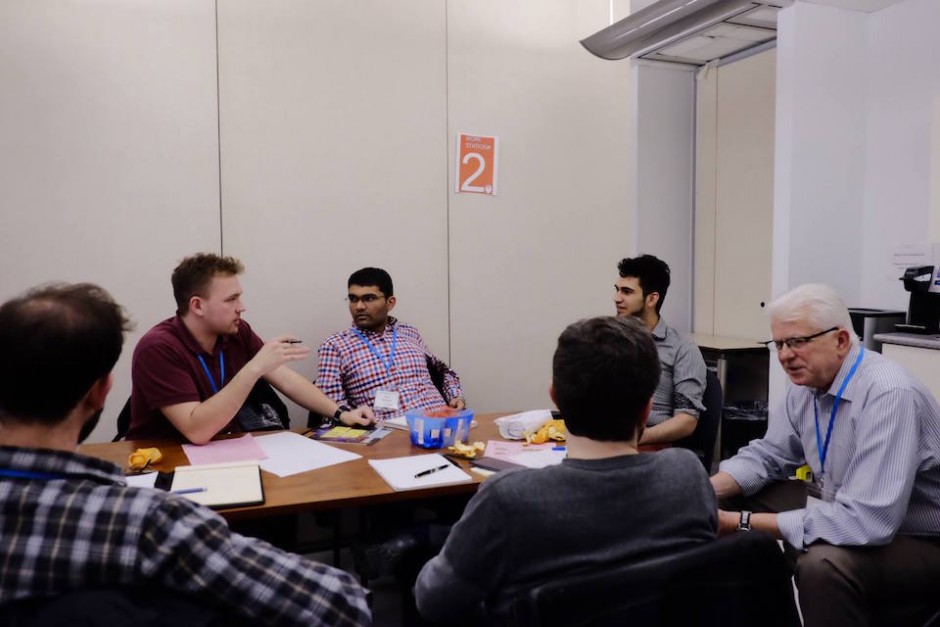The U of T Hatchery hosted its annual Accelerator Weekend on January 22 and 23. The event, which featured leaders in entrepreunership from the famed Y Combinator — a top Silicon Valley incubator responsible in part for launching successful ventures such as Dropbox -— was geared towards providing students with advice and mentroship in their own start-up projects. Under the guidance of seasonsed veterans, 23 student teams developed their ideas into viable business models, with the top two taking home $2000, and $1000, respectively.
“The floor is completely open. If you (…) want to stay over night, we’re going to stay over night. If you get tired, we have fifteen gallons of coffee available. We’re going to use every single minute of your energy to create those startups,” said Hatchery founder and Executive Director Joseph Orozco in his opening remarks. “There is lots of food, and places to nap… just don’t go home,” he joked.
The following day was devoted to brainstorming and refining pitches and business models to impress the judges.
“[Some of our] [s]ucessful startups include crowd funding startups, patents being filed, some startups [that] have received grants of over $200,000, we have companies (…) funded by investors [for] over $2 million,” says Orozco.
“Our mission is to see how we can take startups to the next level. That is why we are hosting Y-Combinator here.“
After the preliminary judging on Saturday evening by two panels of experts, six teams were chosen as finalists. After one more round of presentations, the judges convened and declared Touch Down Parking as the winner, while Aurum finished second place.

Students participate in the Accelerator Weekend startup competition at the U of T Hatchery. Courtesy Haman.
Touch Down Parking’s winning idea was a parking management system that is peer-to-peer and effortless to use.
“Initially, what you would see happening is people who have vacant parking spaces in Toronto renting those spaces out to other people who are commuting into Toronto for a given time period.” says Bryan de Bourbon, one of the members of Touch Down. “In general we would want the parking spaces to be able to be booked so that you can plan your route ahead of time, but in a way that you don’t have to deal with frustratingly trying to find parking spaces — and probably using your phone while you’re driving (…) what we’re trying to reach in the long run is more like an integrated parking system —like the Internet of parking.”
Bryan went on to say that his team’s business would evolve into an intuitive parking solution, seamlessly integrated with route navigation, to transform parking in the city into a completely stress-free experience.
“It should be as simple as ‘I’m already planning my route, it already knows where I’m going, it should find a spot for me and I will deal with payment and run from my car to where I’m going.’ ”
Second place winner Aurum’s idea was to use noise cancelling technology — typically reserved for commercial aircrafts — to create an at-home system for those living in noisy urban environments.
The system would be installed in the home to cancel noise from sources like busy streets and late night parties in neighbouring apartments.
The activities hosted by The Hatchery allow Joseph to observe the learning process for young entrepreneurs on their journey towards making startup dreams a reality. He believes that now, more than ever, students with an entrepreneurial spirit have the benefit of an inclusive, supportive environment that fosters creativity while encouraging financial success. “What we’re doing is (…) giving the students a real-life alternative of what an entrepreneur does in years. (…) You come here to go through that process that takes five years – in 28 hours. The final product of those 28 hours is a pitch that represents your startup and how you plan to sell it. And, of course, make money.” says Orozco.
As an entrepreneur, Orozco’s first startup was Telequote. For 14 years, it was a financial information network meant to be a smaller competitor to Reuters and Bloomberg.
“There’s no genius in entrepreneurship and I believe that everyone has the sense that they want something of their own and they want to work hard [to make it happen].”
“Sometimes they are afraid of taking risks and [of] not having all the resources. But when you acknowledge those [fears], you are ready to take the risk and there’s no better time (…)[and there is] so much support for young entrepreneurs to give it a try.”
Correction (February 4, 2016): An earlier version of this article misidentified Joseph Orozco.


